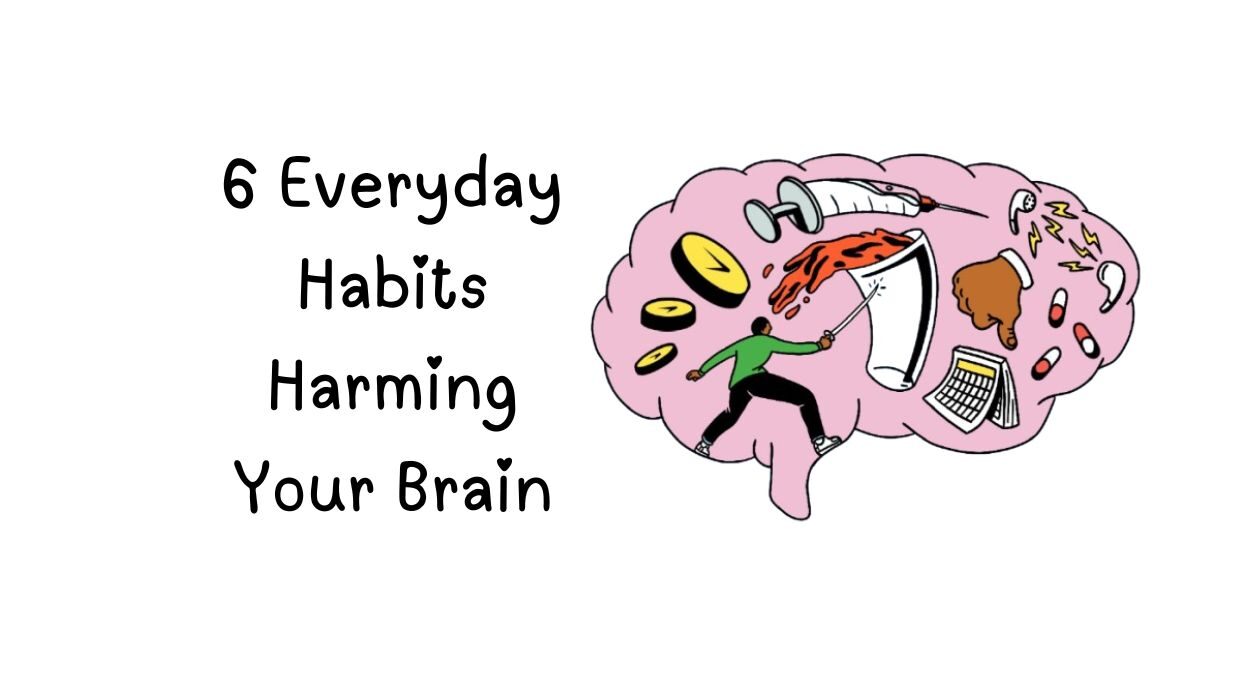Your daily routine could be slowly harming your brain without you realizing it. From skipping breakfast to endless notifications, these common habits may be shrinking your memory, lowering focus, and even increasing dementia risk.
Neuroscience reveals that small, repeated behaviors rewire your brain over time—and not in a good way. Here are 6 surprising habits damaging your brain and how to fix them.
Table of Contents
6 Everyday Habits Harming Your Brain
1. Skipping Breakfast – Shrinks Your Memory Center
🔬 Science Says:
- Reduces hippocampus size (key for memory & learning)
- Slows cognitive response & focus
- Raises cortisol → brain inflammation
💡 Fix It:
✔ Eat protein + healthy fats (eggs, nuts, avocado)
✔ Avoid sugary cereals (spikes & crashes blood sugar)
2. Multitasking – Weakens Decision-Making & Emotional Control
🔬 Science Says:
- Reduces gray matter in the anterior cingulate cortex
- Increases mental fatigue & stress hormones
- Lowers deep thinking & creativity
💡 Fix It:
✔ Use Pomodoro Technique (25-min focused work bursts)
✔ Turn off email/social media notifications
3. Oversleeping – Causes Brain Fog & Stroke Risk
🔬 Science Says:
- Sleeping >9–10 hours → poor REM sleep (critical for memory)
- Linked to higher dementia risk
- Disrupts circadian rhythm → lower alertness
💡 Fix It:
✔ Stick to 7–9 hours of sleep
✔ Improve sleep quality (dark room, no screens before bed)
4. Constant Phone Notifications – Rewires Your Brain for Stress
🔬 Science Says:
- Puts brain in hyper-vigilant mode (dopamine spikes)
- Weakens prefrontal cortex (impulse control & focus)
- Disrupts Default Mode Network (DMN) → lowers creativity
💡 Fix It:
✔ Turn off non-essential notifications
✔ Schedule “notification-free” hours
5. Avoiding Sunlight – Lowers Mood & Memory
🔬 Science Says:
- Lack of sunlight → low serotonin & dopamine (mood crashes)
- Disrupts sleep-wake cycle → poor focus
- Reduces BDNF (protein for learning & memory)
💡 Fix It:
✔ Get 15–20 mins of morning sunlight
✔ Use light therapy lamps in winter
6. Dehydration – Shrinks Brain Tissue Temporarily
🔬 Science Says:
- Just 2% dehydration → slower thinking, memory lapses
- Prefrontal cortex (decision-making) is most affected
- Increases mental fatigue & irritability
💡 Fix It:
✔ Drink half your body weight (lbs) in oz daily
✔ Eat water-rich foods (cucumber, watermelon)
Brain-Damaging Habits vs. Fixes
| Habit | Brain Impact | Quick Fix |
|---|---|---|
| Skipping Breakfast | Shrinks hippocampus | Eat protein/fats in AM |
| Multitasking | Lowers gray matter density | Single-task in bursts |
| Oversleeping | Reduces REM sleep | Stick to 7–9 hours |
| Phone Notifications | Weakens focus | Disable alerts |
| No Sunlight | Lowers BDNF & mood | Morning sunlight 15 mins |
| Dehydration | Slows cognition | Drink water hourly |
FAQs
1. Does skipping breakfast cause memory loss?
✅ Yes! Skipping meals reduces hippocampus function, leading to poor memory recall.
2. How does multitasking affect the brain long-term?
It shrinks gray matter in areas controlling focus, empathy, and decision-making.
3. Can too much sleep damage your brain?
Oversleeping (>9–10 hrs) is linked to brain fog, stroke risk, and dementia.
4. Why do phone notifications cause mental fatigue?
They flood your brain with dopamine spikes, leading to chronic stress & poor focus.
5. How much water should I drink for optimal brain function?
At least half your body weight (lbs) in ounces daily (e.g., 150 lbs = 75 oz).
Key Takeaways
✔ Never skip breakfast – Your brain needs fuel!
✔ Stop multitasking – It’s making you dumber.
✔ Sleep 7–9 hours – Too much or too little harms cognition.
✔ Silence notifications – Your focus will thank you.
✔ Get sunlight daily – Boosts mood & memory.
✔ Drink more water – Even mild dehydration slows thinking.



